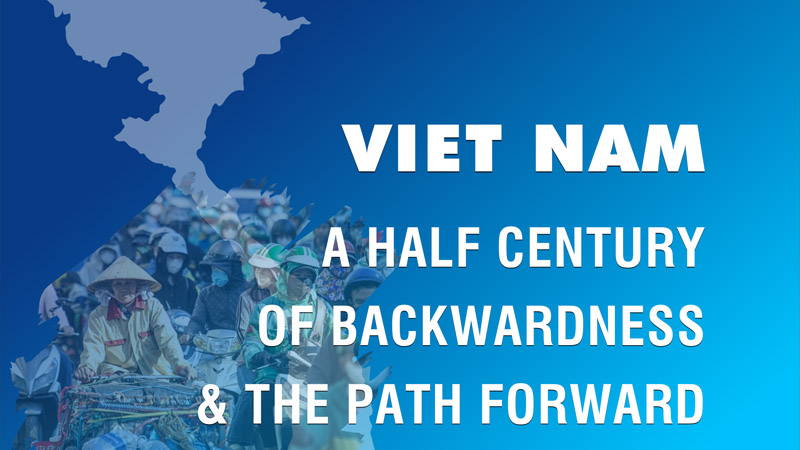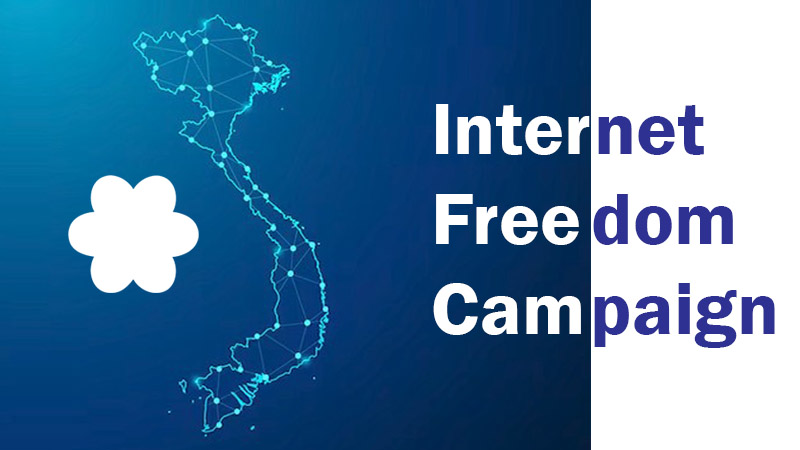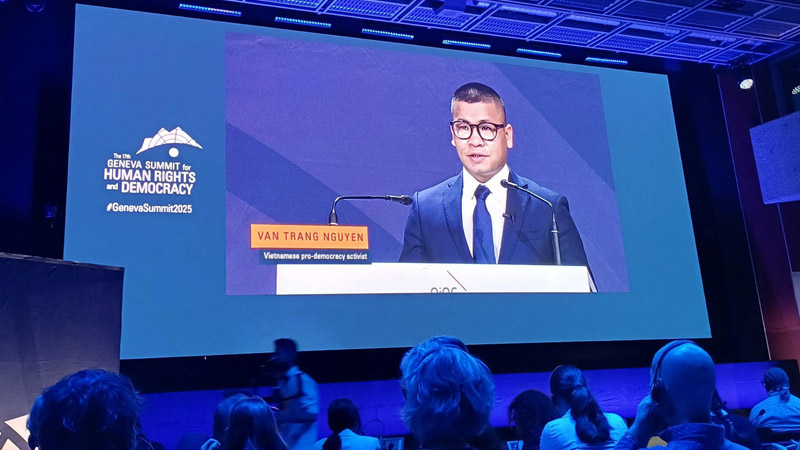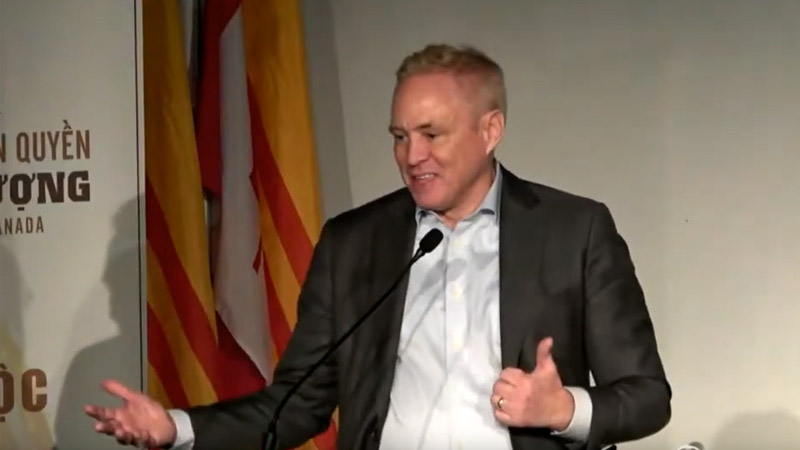During its sixty-first session earlier this year, the United Nations Working Group on Arbitrary Detention (UNWGAD) released Opinion No. 46/2011, finding the government of Vietnam in violation of international law by arbitrarily detaining seven democracy and land rights activists. This decision came soon after the release of another UN opinion (No. 24/2011) finding the arrest of prominent lawyer and activist Cu Huy Ha Vu to also be arbitrary and in violation of international law.
Opinion No. 46/2011 addressed the cases of seven Viet Tan members and supporters: Pastor Duong Kim Khai, Ms. Tran Thi Thuy, Mr. Pham Van Thong, Mr. Cao Van Tinh, Mr. Nguyen Thanh Tam and Mr. Nguyen Chi Thanh. The seven activists were arrested and charged under Article 79 of the Vietnamese Penal Code for helping to organize dispossessed farmers to protest against land confiscation and corruption, as well as spreading public awareness about Chinese encroachment against Vietnamese territory.
Trinity Hong-Thuan from Radio New Horizon (Radio Chan Troi Moi) interviewed Maran Turner, Executive Director of Freedom Now, an NGO that works to free prisoners of conscience through focused legal, political and public relations advocacy efforts. In recent years, Freedom Now has successfully advocated for several Vietnamese political prisoners.
December 21, 2011
Trinity Hong-Thuan: As you know, the United Nations Working Group on Arbitrary Detention has recently released an opinion finding the Vietnamese government to have violated international law by arbitrarily detaining seven democracy and land rights activists, who were either supporters or members of the prodemocracy network Viet Tan. Can you share with us more about this opinion.
Maran Turner: My organization didn’t actually work on this opinion. This case of the land rights activists was submitted by Viet Tan. We helped provide just some strategic advice to Viet Tan. So this isn’t the case I can speak about. They would be the group to speak about the opinion. I can talk more generally just about the UN Working Group and that as a body and how it might be effective.
Trinity Hong-Thuan: You mentioned that this was a case submitted by Viet Tan. So how does the process of filing such a petition usually work? What takes a petition to be responded by the UN working group and usually how long would that be?

Maran Turner: The UN Working Group on Arbitrary Detention (UNWGAD) is a great body in terms of addressing human rights violations specifically for arbitrary detention. And it’s because you can get opinions from them much more quickly than you can with any other body and certainly any other UN body. And Vietnam, as you know is not yet part of a regional human rights commission. There still talks of ASEAN getting up and going with a body that would actually permit people to submit individual complaints to, but currently, the only body to submit complaints to alleging violations of international law in terms of political prisoners is the UNWGAD. You can get an opinion from them in probably eight months, I’m not quite sure how long did it takes Viet Tan to get this decision. It’s a wonderful decision – not only did it find the imprisonment of these individuals of violation of law, but it goes one step further and actually makes some opinion which regards to some of the laws in VN that is way too vague, particularly in this opinion it was Article 79 that was the issue. In previous opinions, I know the UN Working Group has called in to question Article 88 as well, which is another law that the Vietnamese authority often use to persecute activists.
Trinity Hong-Thuan: During the process of making the decision, was there any communications between the UN Working Group and the government of Vietnam?
Maran Turner: Yes, as part of the process before the UN Working Group, it essentially is like a paper litigation (that’s what we call it). So there’s no actual hearing, you don’t go and present arguments and have an opportunity to confront representative of the Vietnamese government. But you do submit legal pleading (legal brief) and then what the UN Working Group does is that it takes summary of those legal petitions and then forward them on to the government to give the government an opportunity to address the allegations that are being made against it and to respond to the claims. In this case, I know that the case was forwarded to the Vietnam government and the Vietnam government did not respond to the petitions.
They have responded to UN Working Group petitions in the past. I can tell you on cases that Freedom Now has taken. We’ve gotten responses from the Vietnam government, but not recently. We are currently working on the case of Father Nguyen Van Ly and we submitted his case to the UN Working Group and got an opinion that Vietnam was violating international law by imprisoning him, and in that case VN failed to respond to the petition as well.
Just one more point here in terms of process once the opinion has reached by the UN Working group members, they then take that opinion and send it over to the government, the government then have the opportunity to see that opinion on its own for three weeks (although they might have changed that to two weeks now) and that gives the government an opportunity to address and to comply with what the UN Working Group opinion is before it publicly releases that opinion to the petitioner. So there’s no question in this case that not only did VN see the allegations originally but they’ve also seen this opinion even before the opinion was released to the public.
Trinity Hong-Thuan: And lastly (and I think this is very important for those who are advocating for human rights in VN), if you can share with us on the other cases in which the UN Working Group ruling has been effective. And I know earlier you mentioned the case of Father Nguyen Van Ly in which Freedom Now has worked on, right?
Maran Turner: Freedom Now has worked on a number of VN cases. We’ve worked on Father Nguyen Van Ly technically three times. We worked on his case in 2004, his arrest was in 2001, so just before he was released. We also worked on his case in 2007 up until he was released in medical discharge, that’s March of 2010. And now, of course he’s been placed back into jail, so we’re currently working on his case again!
So we definitely saw results from the UN Working group opinions and the UN Working Group’s engagement generally on Father Nguyen Ly’s case in the past. Previously we’ve also worked on the case of Pham Hong Son who’s a doctor – his case is well known – he reproduced in Vietnamese the “What Is Democracy?” page from the US Embassy website and was later imprisoned. We also worked on his case and submitted his case to the UN Working group and we believe the opinion from the UN Working Group was also instrumental in helping to secure his release.
Third case was doctor Que, and that case predates my time, so I can’t really speak about it personally, but that was also another case submitted to the UN Working Group. And again, in all those cases VN was found in violation of international law.
Trinity Hong-Thuan: Maran, thank you so much for this interview and for all of Freedom Now’s efforts in advocating for these Vietnamese activists. It’d be great if you can have a few last words to those who are listening.
Maran Turner: My last words would be to keep up the efforts to continue refer human rights violations committed by the government of VN to human rights organizations, particularly to bodies at the United Nations who will be able to address the allegations. I think it’s important to fight human rights violations in legal venues like the UNWGAD because it’s a body that’s looking at the facts and render the decisions based and grounded in international law. I think that’s an important venue to take the Vietnamese government on.
Trinity Hong-Thuan: And any Vietnamese citizen can submit a petition, right?
Maran Turner: Absolutely! As long as the person submitting has knowledge of the case. It really should be a family member or someone close to the person imprisoned or an organization. That’s generally where the UN wants to see the petition come from.
Trinity Hong-Thuan: Thank you Maran.
Maran Turner is Executive Director of Freedom Now. Prior to joining Freedom Now, she was a lawyer with the Southern Africa Litigation Centre (SALC) in Johannesburg, South Africa, where she managed a team of lawyers and worked with Southern African jurists on human rights litigation. Prior to her position with SALC, she was an associate with DLA Piper LLP (US) where she was honored as Pro Bono Attorney of the Year for her international human rights work representing notable human rights defenders such as former Czech Republic President Václav Havel and Nobel Peace Prize Laureate Desmond Tutu. Maran holds a B.A. from the University of Texas at Austin and a J.D. cum laude from the University of Miami.
By Trinity Hong-Thuan for Radio New Horizon





